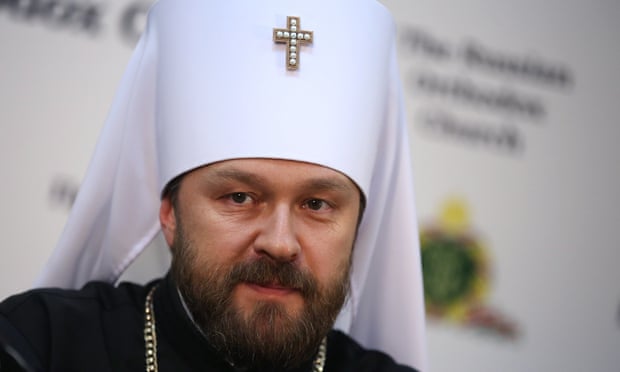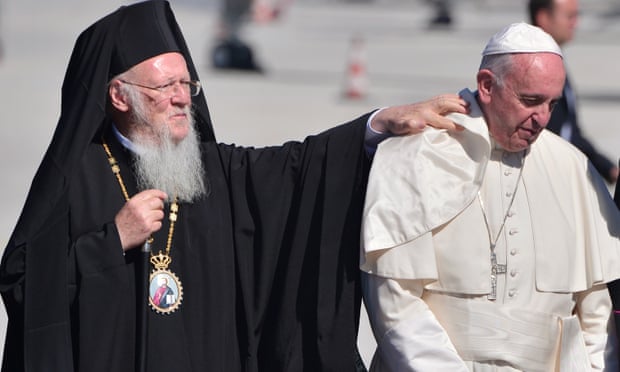After 55 years of planning, the historic holy and great council of 14
Orthodox churches in Crete may collapse over power struggle
After an interlude of more than a millennium, 55 years of careful
planning, and within days of its opening, the first global gathering of
Orthodox churches since the year 787 is teetering on the brink of
collapse amid dissent and power struggles.
The historic “holy and great council” of the world’s 14
self-governing Orthodox churches, due to begin in Crete on Sunday, may
not go ahead after five pulled out.
The unravelling of the week-long Pan-Orthodox Council, which has been in preparation since 1961, began with Bulgaria saying earlier this month it wanted a postponement, citing disagreements over the agenda.
On Monday, the Russian Orthodox church – the largest and richest – announced it would not attend the meeting, dealing what may be a fatal blow to the gathering.
The council was called by the ecumenical patriarch, Bartholomew I of
Constantinople, the “first among equals” of leaders of the global
Orthodox churches, which collectively represent 300 million people. In
the past 1,000 years there have been smaller council meetings, but none
on the scale of the Crete gathering.
The aim of next week’s meeting is to discuss their future, issues of
unity and efforts to heal the bitter rift with the Roman Catholic
church, which dates back to the “great schism” of 1054.
Agenda items include the mission of the Orthodox church in the 21st
century, autonomy, marriage, the importance of fasting, and relations
with the rest of the world.
On 3 June, the Bulgarian Orthodox church reversed its earlier
commitment to attend the meeting. Among its reasons were disagreements
over the agenda and the proposed seating plan for the 500 participants.
It cancelled a chartered flight to Crete and informed the heads of the
other 13 churches about its decision. The Serbian, Georgian and Antioch
churches followed suit, leading to Russia saying it would not attend without all churches present.
Hilarion Alfeyev,
a bishop in the Russian church, said: “We have made a decision that we
will not be able to take part in the all-Orthodox synod if other
churches do not go. All churches should take part … and only in this
case the decisions of this assembly will be legitimate.”
The council’s organising committee has called dissenting churches to a
meeting on Friday to try to resolve differences. “There is no mandate
to change or postpone and we are going to proceed,” said the Rev
Alexander Karloutsos, a member of the council’s organising committee.
Mark Woods, a contributing editor to Christian Today,
said he was doubtful that the council could take place without the
Russian church. But, he added, “if it doesn’t go ahead, it’s a blow to
Bartholomew’s authority. It represents a diplomatic failure on the part
of the ecumenical patriarch and his advisers. It’s a great pity that
they are now at the stage where things have erupted into a crisis.”
Tensions over where power lies, and between conservative and liberal
wings, are behind the ruction. Although Bartholomew is “first among
equals” of the churches’ patriarchs, the Istanbul church he represents
is small and poorly resourced.
The
Russian Orthodox church, on the other hand, represents a majority of
Orthodox Christians and commands huge wealth. Its leader, Patriarch Kirill, is closely allied to Vladimir Putin, the Russian president, whom he has described as “a miracle of God”.
“The rivalry between the powerful Russian church, which encompasses
two-thirds of the world’s Orthodox population, and the ecumenical
patriarch of Constantinople, which numbers less than 3,000 faithful in
Istanbul but boasts a primacy of honour over all of Orthodoxy, has in
fact been for years one of the most serious conflicts within the
Christian East,” wrote the Italian analyst Sandro Magister earlier this year.
He added: “Kirill plainly intends, in fact, to strip Bartholomew of
his exclusive status as the top symbolic representative of Orthodoxy in
the world which Bartholomew enjoys, partly due to the excellent
relations that he maintains with the Church of Rome and the pope.”
Some Orthodox churches are deeply concerned about “inter-Christian cooperation”, especially those who believe Catholicism
to be heresy; and some fear relatively liberal influences on the issues
of marriage and how the church responds to modern society.
Added to the potent mix of dissent is a bitter dispute between the
Antioch and Jerusalem patriarchs. Three years ago the Orthodox
Patriarchate of Jerusalem appointed without consultation a priest as
archbishop of Qatar, triggering a turf war with the Antioch Patriachate
over which church has jurisdiction.
Pope Francis
announced he was sending two Vatican observers to Crete. One of them,
Brian Farrell, secretary of the Pontifical Council for the Promotion of
Christian Unity, said that the Orthodox document on ecumenical relations
was “very conservative”.
“It insists on the point that the Orthodox church is the only one,
true church. It recognises relations with the Catholic church are hugely
important and positive, but there is no recognition of the Catholic
church as church in the proper sense,” he told America magazine.
Anglicans, Lutherans, Oriental Orthodox and other Christian
denominations are also planning to send observers if the meeting goes
ahead.


